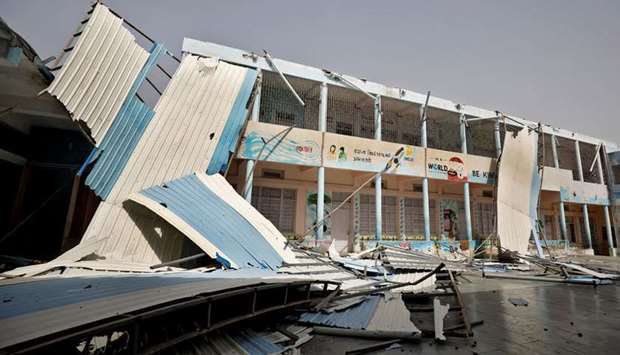The death toll from a major cyclone that slammed into coronavirus-ravaged India jumped to at least 84 on Wednesday, as the navy searched for 65 people still missing and authorities scrambled to restore power to the worst-hit regions.
Cyclone Tauktae, which pummelled the western coast late Monday and left a trail of destruction, has added to the country's woes as it suffered a record number of Covid-19 deaths.
The cyclonic storm was the latest in what experts say is a growing number of ever-bigger storms in the Arabian Sea because of climate change warming its waters.
The defence ministry said Wednesday that Navy ships had rescued more than 600 people after waves up to eight metres high hammered offshore oil installations.
But 22 bodies were also recovered while planes and helicopters were still searching for 65 workers missing from one of several support vessels that slipped its moorings in the storm and sank.
M.K. Jha, head of the Naval Western Command, said that the sea was so rough that they could not board life rafts.
Those rescued have "hope in their eyes but certainly, they are distressed... they have been battered by the sea conditions for multiple hours," Jha told the NDTV news channel.
Even before the cyclone made landfall in Gujarat state with gusts up to 185 kilometres per hour, associated heavy rains and strong winds killed around 20 people in western and southern India.
Gujarat officials said Wednesday that the death toll in the state after the storm had risen to 42, with many killed by collapsing houses or walls and more fatalities expected as they accessed the scale of the damage.
Those killed included a child crushed by a collapsing wall, an 80-year-old woman killed by a falling pole and a teenage girl by a crumbling roof.
"I have never experienced such intensity in my life," said a hotel owner in the town of Bhavnagar where the winds smashed windows on the seafront and sent trees and power lines toppling.
More than 16,500 houses were damaged, 40,000 trees were uprooted and engineers were working to restore power to hundreds of thousands of people on Wednesday.
More than 15 percent of the total yearly production of salt in Gujarat -- India's biggest producer of the mineral -- was either washed away or unable to be harvested due to flooding, the Indian Salt Manufacturers Association told AFP.
At least a dozen blackbucks classified as endangered in India as well as an unknown number of birds including egrets and herons that nest around human habitation have died, Gujarat's chief wildlife warden, Shyamal Tikadar, told AFP.
Chief forests conservator D.T. Vasavada added that his department would survey the affected wildlife after uprooted and fallen trees were cleared.
Prime Minister Narendra Modi tweeted after a survey of the damage in Gujarat, his home state, that his government was "working closely with all the states affected by the cyclone".
He announced financial aid for the state as well as for the families of the victims and those injured.
Although the cyclone was one of the fiercest in decades, better forecasting than in previous disasters meant that 200,000 people in danger zones -- including hundreds of Covid-19 patients -- were moved to safety.
The deadly weather system hit as India's healthcare system struggled with a coronavirus surge that in the past 24 hours killed a record 4,529 people.
"This is one of the most powerful cyclones we've faced in India for decades, and after weeks of chaos and devastating loss of life caused by Covid-19, it could not have come at a worse time," said Santanu Chakraborty of the charity Save the Children.
"Thousands of children and their families have lost their homes and their livelihoods, and the damage caused to roads and infrastructure will put even more pressure on local administrations already struggling to cope with the fallout from the pandemic."
The Arabian Sea previously experienced fewer severe cyclones than the Bay of Bengal but rising water temperatures because of global warming was changing that, Roxy Mathew Koll from the Indian Institute of Tropical Meteorology told AFP.

A view shows the damaged rooftop of a school building following Cyclone Tauktae in Vanakbara in Diu, India
